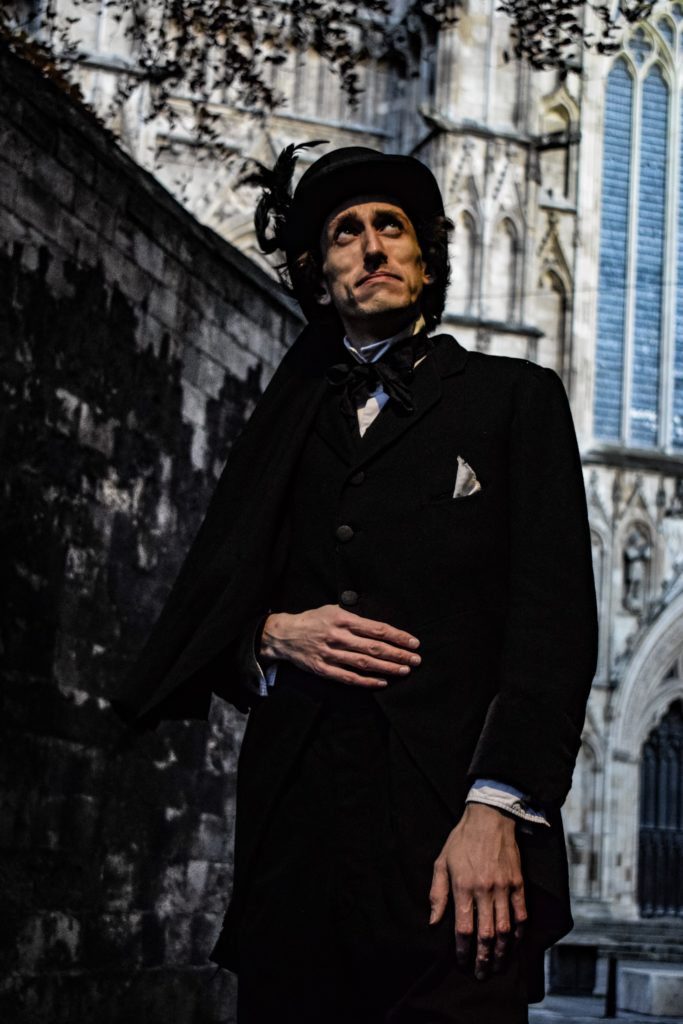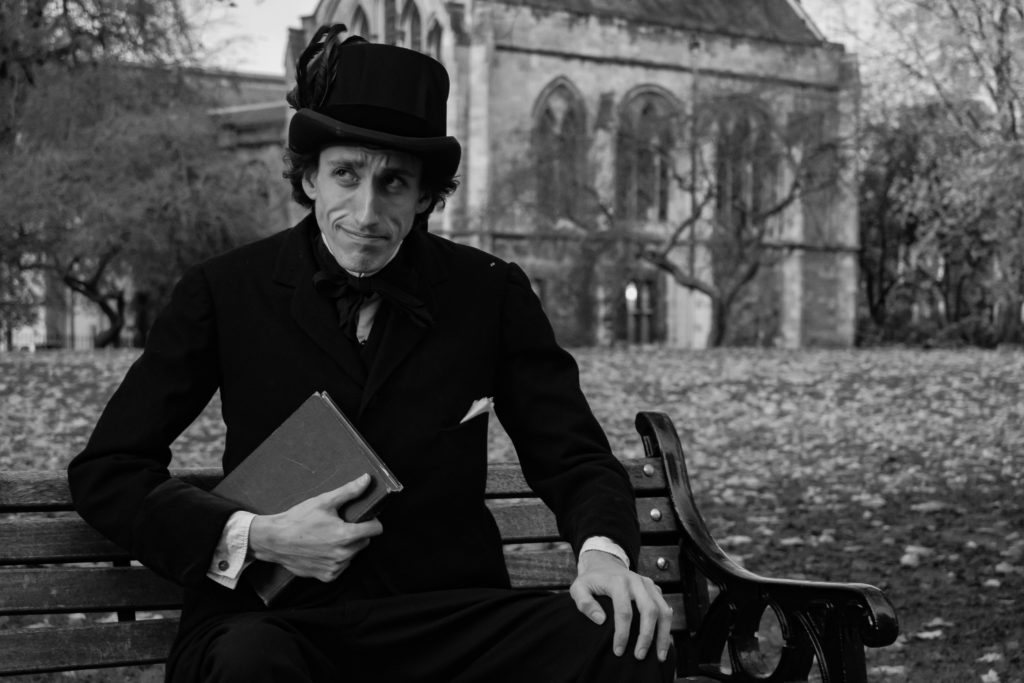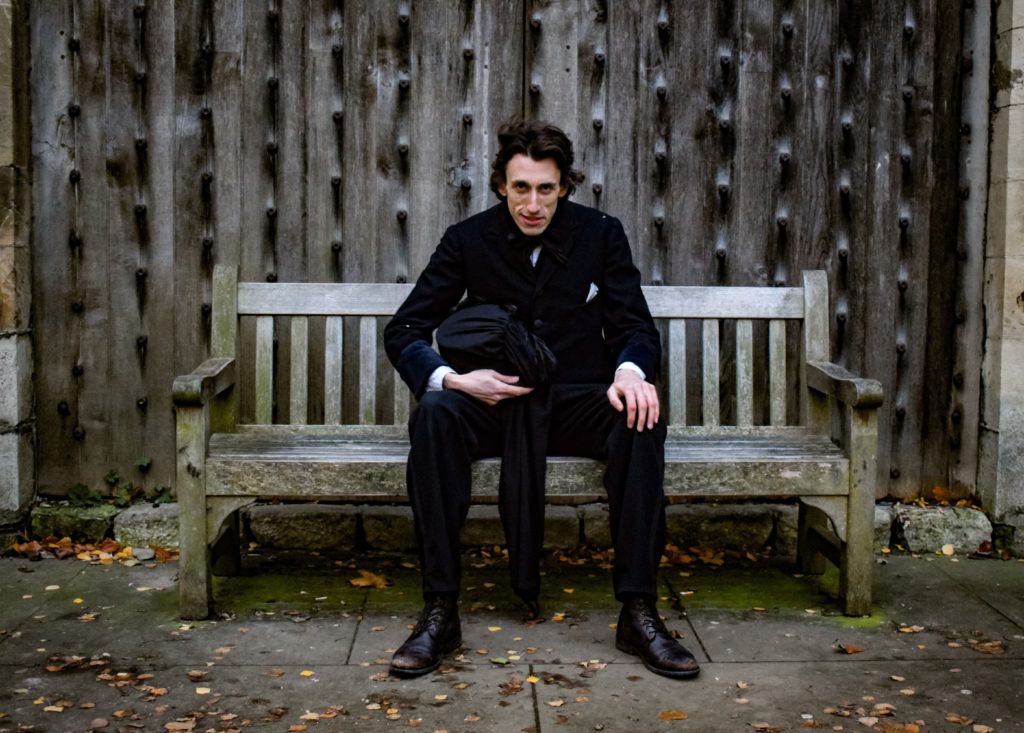
AFTER the silent nights of last December, York gothic actor supreme James Swanton is gleefully reviving his Ghost Stories For Christmas trilogy at York Medical Society, Stonegate, York.
“What an enormous relief it is to return to live theatre,” says this former winner of the Outstanding Performing Artist prize in the now dormant York Culture Awards as he prepares for his Dickensian yarn-spinning residency on various dates from December 2 to 13.
Once more, he will be the black-clad, spindle-fingered gatekeeper for all manner of supernatural terrors after memorising three hours of wintery material for his “seasonal roulette of three Dickensian tales”.
Ghost Stories For Christmas comprises James’s solo renditions of A Christmas Carol, The Chimes and The Haunted Man, returning to life anew in York before transferring to the Charles Dickens Museum, in Doughty Street, London, in the run-up to Christmas.
James’s past Dickensian theatre work has met with the approval of notable fellow thesps Simon Callow and Miriam Margolyes, the former describing his West End show Sikes & Nancy as “startling and enthralling”; the latter finding his 2017 performances at the Dickens Museum “extraordinary”, “superb” and “pictorially vivid”.
‘I’m delighted to finally be getting back to live theatre in my home city of York, where it’s hard to imagine a more authentically Dickensian location than the York Medical Society on Stonegate,” says James.
“This year, I’ve scheduled extra performances of A Christmas Carol: the perfect cheering antidote, I feel, to the misery we’ve all been through over the past few years.
“But the two lesser-known stories, The Chimes and The Haunted Man, are also very relevant to our times. The Chimes is absolutely hilarious, but also overbrims with anger at the injustices done to the most unfortunate in society. And The Haunted Man is not only a chilling supernatural tale, but a portrait of a man wrestling with his mental health. These subjects have been much on our minds through the pandemic.”
James judges A Christmas Carol to be “one of the greatest things ever written”. “I’ve found there’s nothing more satisfying to perform as an actor. And there’s no story that audiences are more eager to hear to the end,” he reasons.
As in 2018 and 2019, Ghost Stories For Christmas is selling quickly. “I was shocked 36 hours ago to find that we’d sold 80 per cent of the seats – I think because York Theatre Royal put us in their email newsletter – so I wouldn’t be surprised if we’re completely sold out in the next few days,” says James.
“I’m hoping – if I give the shows next year – to do them at fuller capacity over a longer period. We’re up to seven nights this year, but I wonder if we might build on even that when we get to (I hope) post-pandemic times. Perhaps a bigger venue is something to look into too.”
James Swanton presents Ghost Stories For Christmas, by Charles Dickens, at York Medical Society, Stonegate, York, December 2 to 13. A Christmas Carol: December 2, 3, 6, 7 and 13. The Haunted Man: December 4. The Chimes, December 9. All performances start at 7pm and last approximately one hour. To book, make haste to the York Theatre Royal box office, ring 01904 623568 or head online to yorktheatreroyal.co.uk.

Ahead of his Dickens of a theatrical task in York, James Swanton answers CharlesHutchPress’s questions.
What form do your three shows take: a reading or rather more than that in each one-man show?
“I’m happy to say that these are fully fledged dramatisations rather than Jackanory-style readings. It is quite the Labour of Hercules: 180 minutes of text to memorise to cover the three one-hour readings! But it’s worth it to ensure these pieces are truly alive. My abridgements are closely based on Dickens’s own performance scripts, so their faith to their sources is absolute.”
Will you use a similar performance style for each tale?
“This is old-fashioned storytelling in a suitably atmospheric space. I’m hoping to use every physical and vocal trick in my repertoire to make the audience see Dickens’s pictures as clearly as I do myself.”
What are the storylines in The Chimes and The Haunted Man?
“Just like A Christmas Carol, these lesser-known works hinge on disenchanted older men who must encounter the supernatural to change for the better. The Chimes is the exuberant tale of a lowly ticket-porter who finds goblins squatting in the bells of his local church.
“Meanwhile, The Haunted Man is a Gothic chiller about a chemist who hatches a bargain with his ghostly double to remove all of his sorrowful memories.”
What have you been up to since you were last to be spotted on a York stage pre-Covid’s grim clasp?
“Continuing my supernatural association, I’ve just been back on a southern stage, thanks to the London Horror Festival, with a very delayed revival of Irving Undead – a production that of course originated at York Medical Society.
“I’ve maintained the home connection by livestreaming M. R. James and Dickens ghost stories with the wonderful York Ghost Merchants throughout the pandemic, from their premises on Shambles to a global audience.
“People would tune in from the most astonishingly far-flung places: various different states in America, Canada, Australia! It was touching to know that people were coming together to share a moment in the middle of the pandemic.’
“And I’ve bashed out horror film after horror film, including the phenomenally popular Host, in which I make the cameo of the century – to absolutely nobody’s surprise – as the demonic spirit who crashes the Zoom call. Business as (un)usual.”
How did you make the Zoom-set Host under Covid conditions?
“The actors shot it at home on their mobile phones during the first lockdown. I struggle to think of any other feature film that’s been partly shot in Acomb – never mind one that went on to reach a global audience.
“Stephen King said he enjoyed it, which was a bit of a thrill, and it was heralded by many critics as the defining horror film of 2020.”
Does the miserable impact of Covid-19’s lockdowns and its refusal to die a death gracefully put the telling of ghost stories in a different light this Christmas?
“I’m sure it does. These tales are all rather death-obsessed beneath their jollier garnishings, though perhaps it’ll make us more inclined to go to these stories for escapism now.

“It’s ironic that the Victorian Christmas has come to stand for a fairytale vision of an idyllic past. Dickens was under no such illusions: The Chimes is especially furious – an unhinged rant in places – though A Christmas Carol isn’t far behind.”
How will the theatre-going experience at York Medical Society differ from the 2019 production? Masks on? Social distancing?
“To keep everyone safe in these uncertain times, it’s primarily been a matter of reducing capacity to give audiences that vital breathing space, so we’re on course for a sell-out much earlier than usual.
“The dividend is that this should guarantee an even more intimate and special experience for those who are able to secure a ticket. But they better rush!”
What makes York Medical Society such a good setting for your performances?
“It’s a building that feels properly immersive: travelling down that alley to the door with the knocker feels like an approach to Scrooge’s house on that fatal night when Jacob Marley’s face put in an appearance.
“I’ve also been pleased to discover that Henry Belcombe, the second president of York Medical Society, was a social acquaintance of Charles Dickens.”
Were you tempted to look at doing any new additions to your Dickens’ Christmas repertoire? Might that happen in future?
“I think the present three work rather well in concert, each one shedding light on the others. Dickens’s other Christmas books can be terribly twee; I did all five at the Dickens Museum in 2017, and Michael Slater (our foremost Dickens scholar) came to The Battle Of Life on the basis that he couldn’t believe anyone had been mad enough to attempt it.
“Of Dickens’s spookier stories, I last year had a crack at The Signal-Man with the York Ghost Merchants – but a less Christmassy tale can hardly be imagined!”
As a performer, what changes when you revisit material you have performed previously? Do you tweak the text at all?
“The material changes as I change; little details leap out or recede every year. For instance, I’ve this time been struck by how Scrooge, like almost all people who pride themselves on ice-cold rationality, turns out to be a being of emotion beyond anything. He bursts into tears at the drop of a hat throughout his story.
“More practically, the text of The Haunted Man has been in a state of flux from the word go. It’s the only one of the three that Dickens didn’t perform himself – he started preparing a script before abandoning it – so I’m determined to one day crack it.”
What can we learn as a modern society from social reformist Dickens’s ideal of a good Christmas?
“Focus on your family. The Christmas dinner served up by the Cratchits is impoverished indeed, but their delight in each other’s company makes it into a feast.
“But Dickens also means us to acknowledge the entire human family. We are all of us connected and we only have a very, very little time to get life right; to leave this world fractionally better than when we entered it.”
